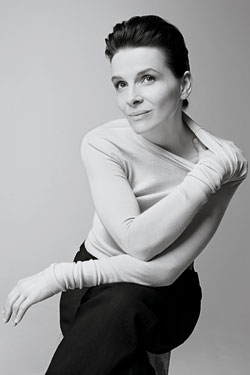
Juliette Binoche’s brief, intense affair with dance began not with a leap, but a massage. “My masseuse asked me, ‘Do you want to dance?’ And I said yes,” Binoche matter-of-factly recalls. “She was in contact with my body, massaging. I figure she saw my potential, and felt I could maybe have a strong physical experience.”
As it happened, it wasn’t an idle question. That masseuse’s husband works with the acclaimed British choreographer Akram Khan, known for his propulsive combination of contemporary and kathak (Indian classical) styles. Binoche watched Khan’s company perform, then met him, and within three days the two decided to work together. “He has a very soft presence with a lot of power, a sort of stillness, and that’s what I like,” Binoche, who is 45, says. Her emotionally raw performances as an actress, which typically hide steeliness behind a delicate exterior (The English Patient, Chocolat, Caché), well fit that description. “She has vulnerability in abundance,” Khan says of what drew him to her. “And that’s something I always noticed in the roles she chooses. It’s so terrifying—it’s the most frightening, violent quality. She reaches to the bottom, really.”
When creating In-I, a duet examining the complexities and chronology of a relationship (premiering Stateside here after a worldwide tour), Binoche and Khan quickly found challenges both physical and emotional. Each of them acts and dances in the piece, taking both performers out of their comfort zones. “There were definitely moments when I thought it would be impossible for me, because I couldn’t breathe—it was as simple as that!” she says. Khan, too, calls In-I “the hardest journey for me”—Binoche’s naturalistic approach, innocent of the formal dance training he usually encounters, meant that he had to rethink his work process completely. “Knowledge is a blessing but also a prison,” he says.
The two eventually found common ground by devising, through improvisation, a movement language that would feel true to Binoche the non-dancer. “As an actor, you embody the movement inside,” Binoche explains. “So I was very interested in continuing this experience, even bigger, into the body.” At the same time, she and Khan remained determined not to portray her as a new modern-dance talent. “Of course she will never dance the way I dance; of course I can never act at the level she acts,” Khan says. “What we’re trying to say is, that doesn’t mean there isn’t a dancing body within the actress, or an actor within the dancer.”
Though Binoche remains proud of In-I, she also insists that it’s the only dancing she’ll ever do. When I ask whether she’ll perform again, she says, sharply, “No! The answer is very clear! Being an artist is to go into the unknown and create something new. That’s why I hate remakes, the ‘second film,’ whatever it is. I think it is against artists.” That said, her two-year hiatus from acting has now ended—and she’s returned with a fresh perspective. “After being onstage with Akram, suddenly being in front of a camera—it’s immobile!” she exclaims. “It’s dance, but in a different way.”
In-I
Performed by Juliette Binoche and Akram Khan.
BAM, September 15–26.